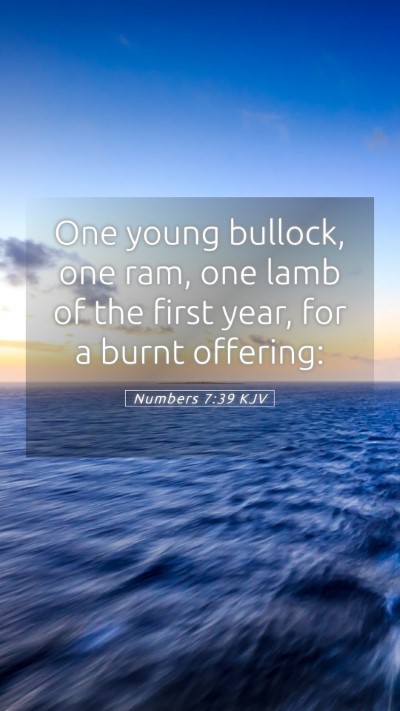Understanding Numbers 7:39 - Biblical Commentary and Insights
Numbers 7:39 states: "The one son of Abidan, Ahijah, his offering: one silver charger, the weight whereof was a hundred and thirty shekels, one silver bowl of seventy shekels, after the shekel of the sanctuary; both of them were full of fine flour mingled with oil for a meat offering." This verse details the offerings made by Ahijah, the son of Abidan, within the context of Israel's tribal contributions during their wilderness journey.
Summary of Insights from Public Domain Commentaries
Below is a compilation of insights from renowned Biblical commentators Matthew Henry, Albert Barnes, and Adam Clarke, reflecting on the meanings, interpretations, and significance of this verse within the broader narrative of Scripture:
-
Matthew Henry's Commentary:
Matthew Henry emphasizes the meticulousness of the offerings that were made, highlighting the importance of dedicating valuable resources to God. The silver charger and bowl were significant in their weight and purity, symbolizing the value of giving our best to God. This act reflects a heart of worship and devotion, illustrating that sincere offerings are a crucial aspect of our relationship with the Divine.
-
Albert Barnes' Notes:
Albert Barnes elaborates on the symbolism of weight in offerings. The precise weights of the silver charger (130 shekels) and the bowl (70 shekels) embody not only the physical offerings but also the heart's intention behind them. He notes that these contributions were assets of value, meticulously weighed, representing the accountability associated with offerings to God. Barnes indicates that such practices build community in faith, encouraging others to contribute generously.
-
Adam Clarke's Commentary:
Adam Clarke discusses the significance of the offerings in context. He points out that Ahijah, as a representative of his tribe, not only presents the material gifts but also stands for the tribe's commitment to God. Clarke's analysis renders this offering as a prophetic act, setting a pattern for communal worship and service that extends beyond physical contributions, rooting deeper into faith and obedience.
Historical Context and Theological Implications
The offerings described in Numbers 7 are rooted in a rich historical context where the people of Israel were encamped in the wilderness after their exodus from Egypt. These offerings were part of the dedication of the Tabernacle and the Levitical priesthood, revealing the profound connection between material offerings and spiritual devotion. They serve as a representation of God's provision for His people and the people's gratitude in return.
The act of offering was not merely transactional; it was an integral part of covenantal life. The precision in the offerings signifies God’s desire for excellence and purification in worship, foundational themes highlighted in both Old Testament worship and New Testament teaching about offerings (see Hebrews 13:16).
Applications of Numbers 7:39 in Life Today
Reflecting on Numbers 7:39, believers are encouraged to consider how they might offer their best to God in various aspects of life. This could involve using personal talents, time, and resources effectively to advance the Kingdom. Here are some applications:
- Generosity: Being generous with resources and time, understanding that such offerings are a reflection of one's heart.
- Quality over Quantity: Emphasizing the quality of what is offered to God, recognizing that God values the heart behind the gift.
- Community Worship: Engaging in communal worship practices that reflect collective commitment to serving God, similar to how the tribes collectively contributed.
Additional Bible Cross References
This verse can be related to several other passages that discuss offerings and their significance:
- Exodus 25:2: God asks Moses to tell the Israelites to bring their offerings.
- Leviticus 2:1: Instructions on grain offerings and their preparation.
- Hebrews 13:16: An instruction to do good and share with others, echoing the heart of offerings.
Conclusion
In conclusion, Numbers 7:39 not only provides insights into ancient Israelite worship practices but serves as a timeless reminder of the importance of dedicated offerings in a believer’s life. The values encapsulated in this verse encourage a deeper understanding of what it means to worship God through our material resources and communal engagement. By studying this verse and its commentaries, one can achieve a richer grasp of Bible verse meanings, interpretations, and applications in today’s context.


